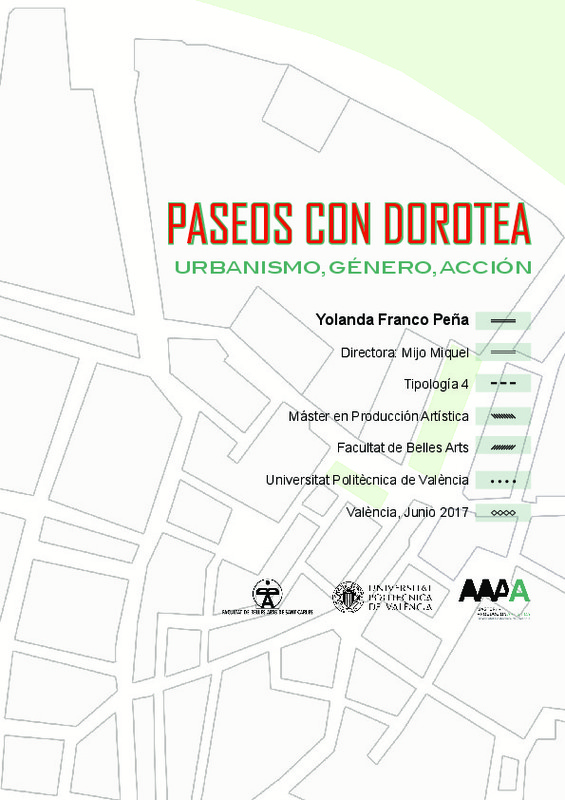JavaScript is disabled for your browser. Some features of this site may not work without it.
Buscar en RiuNet
Listar
Mi cuenta
Estadísticas
Ayuda RiuNet
Admin. UPV
Paseos con Dorotea. Urbanismo, género, acción
Mostrar el registro sencillo del ítem
Ficheros en el ítem
| dc.contributor.advisor | Miquel Bartual, María José
|
es_ES |
| dc.contributor.author | Franco Peña, María Yolanda
|
es_ES |
| dc.date.accessioned | 2017-12-04T19:41:33Z | |
| dc.date.available | 2017-12-04T19:41:33Z | |
| dc.date.created | 2017-07-04 | |
| dc.date.issued | 2017-12-04 | es_ES |
| dc.identifier.uri | http://hdl.handle.net/10251/92004 | |
| dc.description.abstract | The main objective of this work is to analyze how performance and game can become a tool to observe space from a feminist perspective and thus bring social change. This research focuses on studies of urban planners and critical thinkers who work on everyday space. We part from the assumption that everyday space is far from neutral. Feminist theories have questioned the studies and the construction of cities as universal spaces that take all of its citizens into account. This project has tried to generate a methodology that allows the development of an analysis device for a specific neighbourhood, in this case the Carmen neigbourhood, from a gender and inclusive perspective. This device, materialized as a playing game, is conceptualized through theoretical artistic sources. It has also been combined with interviews and it calls for participation to activate the device. | es_ES |
| dc.description.abstract | El presente trabajo tiene como objetivo principal analizar cómo la performance y el juego pueden llegar a ser una herramienta para observar el espacio desde una perspectiva feminista y así coadyuvar al cambio social. La investigación se basa en estudios de urbanistas y pensadoras críticas que trabajan sobre el espacio cotidiano. El punto de partida es que el espacio cotidiano no es neutro. Desde las teorías feministas se han cuestionado los estudios y la construcción de las ciudades como espacios universales que tienen en cuenta a todos sus ciudadanos. En este proyecto se ha tratado de generar una metodología que permita desarrollar un dispositivo de análisis de un barrio concreto, en este caso el barrio del Carmen, desde una perspectiva de género e inclusiva. Este dispositivo, materializado en forma de juego, es conceptualizado a través de fuentes referenciales teórico/artísticas. | es_ES |
| dc.language | Español | es_ES |
| dc.publisher | Universitat Politècnica de València | es_ES |
| dc.rights | Reconocimiento - Compartir igual (by-sa) | es_ES |
| dc.subject | Urbanism | es_ES |
| dc.subject | gender | es_ES |
| dc.subject | performance/action | es_ES |
| dc.subject | everyday life | es_ES |
| dc.subject | feminism | es_ES |
| dc.subject | game | es_ES |
| dc.subject | Carmen neighborhood | es_ES |
| dc.subject | Urbanismo | es_ES |
| dc.subject | género | es_ES |
| dc.subject | performance/acción | es_ES |
| dc.subject | cotidianeidad | es_ES |
| dc.subject | feminismo | es_ES |
| dc.subject | juego | es_ES |
| dc.subject | barrio del Carmen | es_ES |
| dc.subject.classification | ESCULTURA | es_ES |
| dc.subject.other | Máster Universitario en Producción Artística-Màster Universitari en Producció Artística | es_ES |
| dc.title | Paseos con Dorotea. Urbanismo, género, acción | es_ES |
| dc.type | Tesis de máster | es_ES |
| dc.rights.accessRights | Abierto | es_ES |
| dc.contributor.affiliation | Universitat Politècnica de València. Departamento de Escultura - Departament d'Escultura | es_ES |
| dc.contributor.affiliation | Universitat Politècnica de València. Facultad de Bellas Artes - Facultat de Belles Arts | es_ES |
| dc.description.bibliographicCitation | Franco Peña, MY. (2017). Paseos con Dorotea. Urbanismo, género, acción. http://hdl.handle.net/10251/92004 | es_ES |
| dc.description.accrualMethod | TFGM | es_ES |
| dc.relation.pasarela | TFGM\62452 | es_ES |
Este ítem aparece en la(s) siguiente(s) colección(ones)
-
BBAA - Trabajos académicos [5093]
Facultad de Bellas Artes






